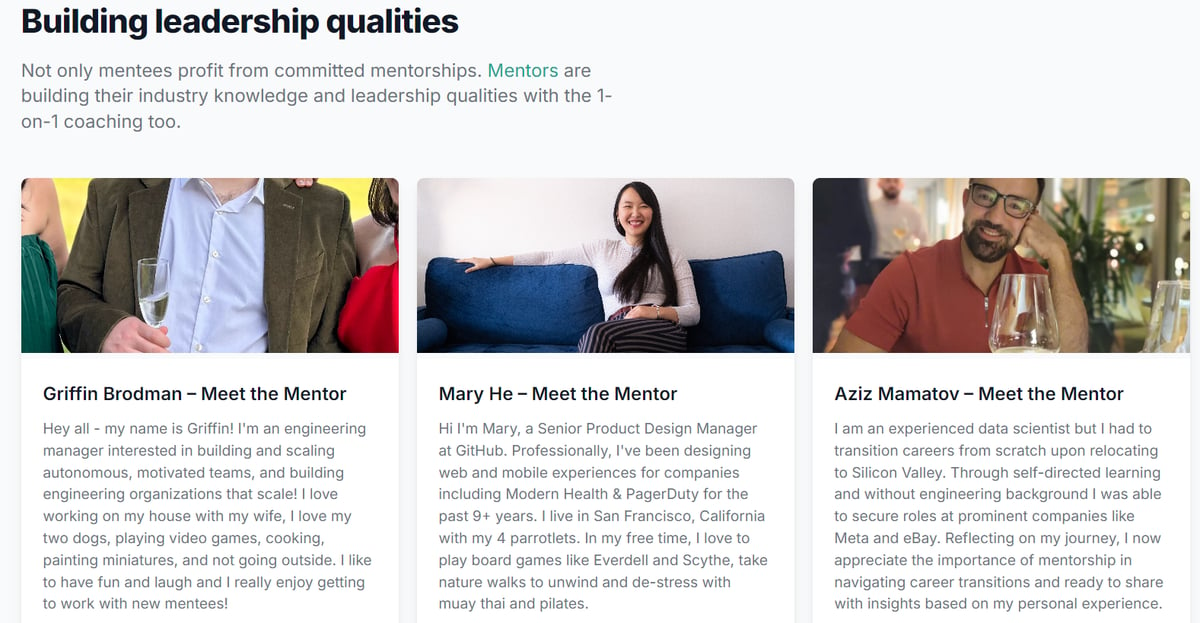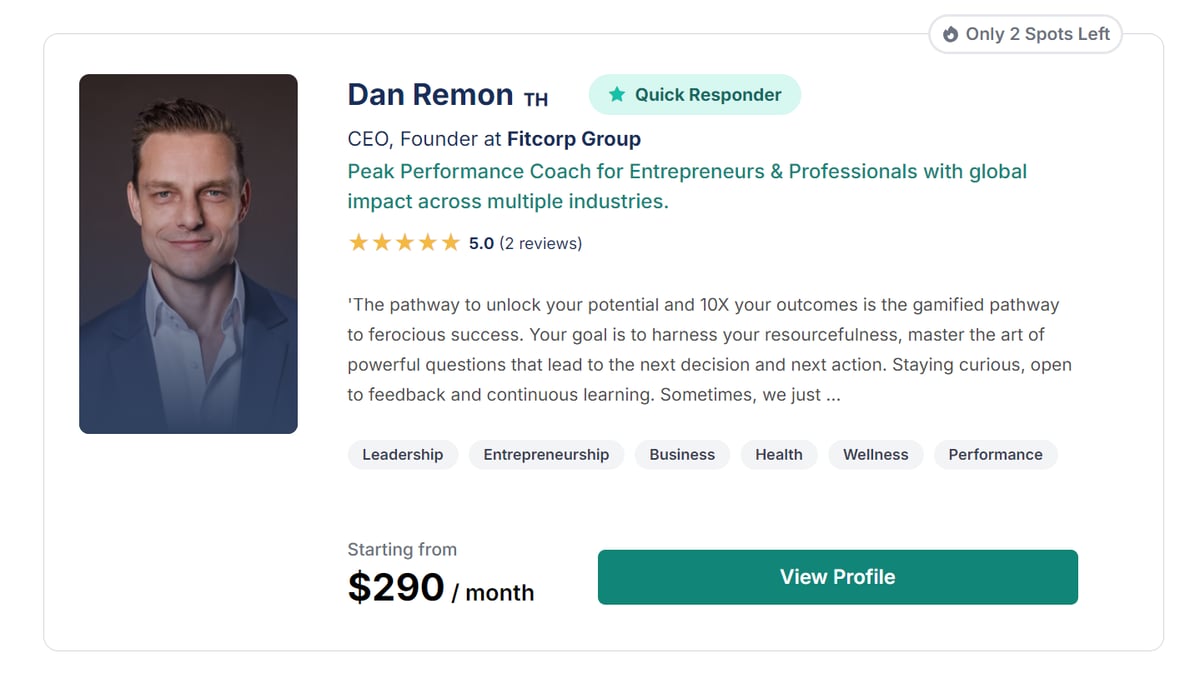Helpful summary
- Why You Can Trust Us: MentorCruise has a proven track record of connecting potential leaders with industry experts, resulting in significant growth in leadership roles, as evidenced by case studies and user reviews.
- Why This Is Important: Developing leaders enhances decision-making, emotional intelligence, and self-awareness. This leads to improved financial performance, talent retention, better strategy execution, and effective change management.
- Action Points: Implement nine key steps to develop leaders, including recognizing potential leaders, providing mentoring, emphasizing soft skills, encouraging reflection, understanding aspirations, giving feedback, teaching networking, offering development opportunities, and maintaining open communication.
- Further Research: Explore additional leadership development resources, mentor matching services like MentorCruise, and continuous learning programs to further enhance leadership skills.
Need help with developing successful leaders?
Renowned American football coach Vince Lombardi once shared a great insight, “Leaders are made, they are not born. They are made by hard effort, which is the price which all of us must pay to achieve any goal that is worthwhile.”
This applies to leaders in business too. Investing in developing leaders is the price that you must pay for success, and there will always be people in your organization who have the potential to become leaders.
But how does the development process work? In this MentorCruise guide, we’ll dive into the most practical approaches to nurture leadership talent and take your business to success. Let’s break down the details.
Why listen to us?
We have first-hand experience in developing leaders by connecting them with industry experts. Our case studies show that potential leaders who found mentors through MentorCruise have grown significantly in their leadership roles.

These leaders reported improved decision-making, emotional intelligence, and self-awareness, enabling them to drive change at work. Access to personalized mentoring programs has helped them achieve their career goals and contribute meaningfully to their organizations.
By solving these pain points, we help businesses cultivate skilled leaders, ensuring long-term success and a robust talent pipeline.
Why is it important to develop leaders?
So why is leadership development important for any business or organization? Developing leaders enables teams to fulfill the following things that can let you drive and achieve success that breaks boundaries.
Step up your bottom-line financial performance
According to 360° Consulting, a company that provides sales leadership and consulting to teams, managers, and executives, companies that invest in human capital deliver stock market returns five times higher than companies that don’t.
Therefore, developing leaders enables you to reduce costs, drive new revenue lines, and enhance customer satisfaction.
Attract, develop and retain talent
Leadership development has the power to boost employee engagement. This then increases your organizational capacity to deal with gaps in your talent pipeline and say goodbye to headaches associated with talent turnover.
Great leaders bring inspiration to other people. A manager without strong leadership attributes will struggle to retain high-performing team members.
Additionally, it is also less expensive in the long-term to develop, coach, and promote people internally than to hire a new person. It’s a good investment overall.
Drive better strategy execution
Effectively developing leaders isn’t development just for its own sake. Organizations must have a leadership strategy closely connected with the strategy of the entire business, equipping employees with the leadership skills required to execute them.
With the right leadership development scheme, organizations can shape the culture and strategy of the business.
Navigate change adeptly
Businesses must embrace change to thrive, but navigating change can be a challenge. Yet, when you develop leaders, you can increase your people’s ability to sail such a disruptive world.
When organizations look beyond developing executives, but see the potential from the rest of the team, agility is magnified.
Practical approaches to developing leaders
Following is a list of important approaches you can adopt so your team can develop well-rounded leaders.
1. Develop a good strategy
Similar to every other business process, the first step in developing leaders is to create a clear strategy. This involves identifying key leadership skills, setting measurable goals, and outlining a structured development plan. A well-defined strategy ensures focused and effective leadership growth.
Navigate this first step with the help of our platform, MentorCruise. Many of our mentors specialize in the area of business strategies. Take, for example, mentor Angela Shi, who provides consulting services for creating effective business strategies for startup and scale-up companies.

2. Spot team members with leadership potential
Leaders in the workplace must exhibit key leadership traits, such as empathy for their colleagues, passion for their work, and commitment to the company’s goals.
So please do your best to look for them.
Howard Schultz, the former CEO of Starbucks, wasn’t initially at the top of the ranks. He was first hired by the coffee chain as the Director of Retail Operations and Marketing. But, Starbucks’ founders recognized his leadership potential after he successfully proposed and executed the idea of selling coffee by the cup, and the rest is history.
3. Mentor potential leaders
Mentoring doesn’t just accelerate the learning journey of your potential leader, the mentee, but also improves their self-awareness, emotional intelligence, and decision-making abilities. This empowers them to become effective, influential leaders who can drive change in your organization.
MentorCruise is one of the best places to introduce your potential leaders to mentorship. All they need to do is to sign up and they can browse our platform to find leadership mentors who can help them reach their goals. These mentors are industry experts, so they can ensure they are getting useful insights.

4. Emphasize the importance of soft skills
When it comes to leadership soft skills are at least as important as hard skills. So, when developing leaders, you must remind them of these soft skills, such as creativity, problem-solving, delegating, and motivating.
Your job is to teach them how they can apply these skills in their work, showing them which ones need improvement. Then, help them create an action plan to help them develop those skills.
Satya Nadella, the CEO of Microsoft, understands this well. He focuses on fostering a culture of empathy within the company, encouraging employees to understand each other's perspectives and work together more effectively.
5. Take a break and reflect
Teach your potential leaders that it’s also important to take a break and reflect. Ask them to allot 10 minutes each day to reflect on the tasks they’ve accomplished, and list their successes and challenges. Ask them to write solutions to those challenges if they happen again in the future.
Then, at the end of every week, meet with them and talk about the solutions they came up with.
Not convinced? Ray Dalio, the founder of Bridgewater Associates, one of the world's largest hedge funds conducts a similar activity every day.
His employees, including leaders and potential leaders, are encouraged to regularly reflect on their experiences, decisions, and outcomes.
6. Find out their aspirations
Ask your potential leaders about their career goals to determine what leadership and growth mean to them. Based on their answers, design tasks that can help them grow as leaders.
One of the companies that does this well is Cleveland Clinic. They implement a three-year leadership development plan to help employees identify their strengths and areas for improvement.
7. Give constructive feedback
Developing leaders is not just about motivation. Regularly providing constructive feedback is an effective way to help your potential leaders be active participants in working to progress their leadership skills.
Luxury watch retailer CHRONEXT implements a continuous performance management system for its team members. This includes regular reviews and goal-tracking, which allows for consistent feedback and praise.
8. Train them to network
Training your potential leaders to network will improve their interpersonal skills and confidence. They can connect more easily with new people and become more comfortable in public speaking engagements.
You can cultivate networking skills at all levels of your organization. Deloitte Luxembourg has the Women in/to Leadership initiative, providing female leaders with opportunities to network with peers, mentors, and senior leaders across the firm.
9. Provide development opportunities
For example, if you give monthly presentations to your department, ask your potential leaders to watch you present. Let them know that they’ll be in that shoe, too, one day in the future. Introducing them to experiences unfamiliar with them can help them grow as potential leaders.
Archana Rao, Atlassian's Chief Information Officer, shared how she actively involves her team in her responsibilities, allowing them to take ownership of various tasks, which in turn helped them develop their leadership skills.
10. Always be available to provide support
Open your communication lines with your potential leaders, letting them know you’re available to talk if they have questions about their assignments and performance. Providing a welcoming environment for them will help them thrive and grow in their new leadership roles.
As an example, let’s go back to Atlassian. Its Chief Technology Officer, Sri Viswanath, implements an open-door policy where he invites all employees to join his leadership meetings. This allows team members to ask questions, seek feedback, and gain insights into decision-making processes, fostering a culture of transparency and continuous learning.
Best practices for developing leaders
Here are the best practices when your company needs to develop leaders.
- Clear Communication: Establish transparent communication channels to ensure understanding of goals, expectations, and feedback.
- Continuous Learning: Encourage leaders to pursue continuous learning through training, workshops, and mentorship to enhance their skills and knowledge.
- Feedback Culture: Foster a culture of constructive feedback where leaders receive regular input on their performance from higher-ups and are encouraged to provide feedback to their team members.
- Empowerment: Delegate authority and responsibility to leaders, empowering them to make decisions and take ownership of their projects, fostering growth and accountability.
- Lead by Example: Demonstrate integrity, resilience, and empathy every day. Don’t forget that you’re a role model too.
Nurture leadership talent with MentorCruise
A report by Deloitte stated that developing the next generation of leaders is the toughest challenge for over half of CEOs. Not to mention, the report indicated that 63 percent of millennials believe their employers do not fully develop them as leaders for managerial positions.
It goes to show how important it is for business leaders to cultivate successful leaders in their organization.
Of all the leadership development approaches we discussed, mentoring might be the most important. Your potential leaders can access MentorCruise to find experienced leadership mentors with insights that can help your team.
With our platform, they get a personalized mentoring program, including curated study plans, regular check-ins, and unlimited actionable support.







